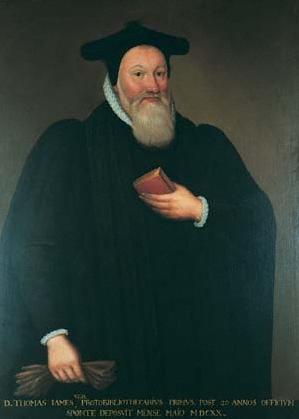Related Research Articles

The Flores Historiarum is the name of two different Latin chronicles by medieval English historians that were created in the 13th century, associated originally with the Abbey of St Albans.

Thomas James was an English librarian and Anglican clergyman, the first librarian of the Bodleian Library, Oxford.

"Hebban olla vogala", sometimes spelled "hebban olla uogala", are the first three words of an 11th-century text fragment written in Old Dutch. The fragment, also known as the Rochester Poem, was discovered in 1932 on the flyleaf of a manuscript that was probably made in the abbey of Rochester, Kent, now Oxford, Bodleian Library, MS Bodley 340. The MS contains a collection of Old English sermons by Aelfric. The Dutch text is found on f. 169v and probably dates to the third quarter of the 11th century. It is usually considered to represent a West Flemish variant of Old Low Franconian.
Walter Hilton, Can. Reg. was an English Augustinian mystic, whose works gained influence in 15th-century England and Wales. He has been canonized by the Church of England and by the Episcopal Church in the United States.

The Bishop of Hereford is the ordinary of the Church of England Diocese of Hereford in the Province of Canterbury.
Ipswich Whitefriars was the medieval religious house of Carmelite friars which formerly stood near the centre of the town of Ipswich, the county town of Suffolk, UK. It was the last of the three principal friaries to be founded in Ipswich, the first being the Ipswich Greyfriars (Franciscans), under Tibetot family patronage before 1236, and the second the Ipswich Blackfriars (Dominicans) founded by King Henry III in 1263. The house of the Carmelite Order of White Friars was established in c. 1278–79. In its heyday it was the home of many eminent scholars, supplied several Provincial superiors of the Order in England, and was repeatedly host to the provincial chapters of the Order.

The Digby Conversion of Saint Paul is a Middle English miracle play of the late fifteenth century. Written in rhyme royal, it is about the conversion of Paul the Apostle. It is part of a collection of mystery plays that was bequeathed to the Bodleian Library by Sir Kenelm Digby in 1634.

Aylesford Priory, or "The Friars" was founded in 1242 when members of the Carmelite order arrived in England from Mount Carmel in the Holy Land. Richard de Grey, a crusader, sponsored them, and conveyed to the order a parcel of land located on his manor in Aylesford in Kent. The estate came back into the ownership of the Carmelite order in 1949. After refurbishment, which revealed 15th century remnants, the manor house was Grade I listed in 1959. After subsequent work on site, the 15th century gatehouse and the NE section of the wall were also Grade I listed on 25 February 1987. The priory now contains an array of contemporary artworks by notable artists. It is a pilgrimage destination of national significance.
Thomas Brome was an English Carmelite friar, provincial of his order from 1362.
Robert de Graystanes, also known as Robert Greystones or Robert Graystanes, was a 14th-century English Benedictine monk, an unsuccessful candidate to become bishop of Durham around 1333, and supposed chronicler of the church of Durham.
John Wessington was an English Benedictine who became prior of Durham Abbey.
Ralph Bocking, was an English Dominican friar and a native of Chichester, Sussex. He was known for being Saint Richard's confessor, friend and ultimately his biographer.
Richard of Lavenham was an English Carmelite, known as a scholastic philosopher. He is now remembered for his approach to the problem of future contingents.
The Poema Morale is an early Middle English moral poem outlining proper Christian conduct. The poem was popular enough to have survived in seven manuscripts, including the homiletic collections known as the Lambeth Homilies and Trinity Homilies, both dating from around 1200.
Samuel Norton (1548–1621) was an English country gentleman and alchemist.

Wisdom is one of the earliest surviving medieval morality plays. Together with Mankind and The Castle of Perseverance, it forms a collection of early English moralities called "The Macro Plays". Wisdom enacts the struggle between good and evil; as an allegory, it depicts Christ and Lucifer battling over the Soul of Man, with Christ and goodness ultimately victorious. Dating between 1460-1463, the play is preserved in its complete form in the Macro Manuscript, currently a part of the collection of the Folger Shakespeare Library. A manuscript fragment of the first 754 lines also belongs to the Bodleian Library. Although the author of Wisdom remains anonymous, the manuscript was transcribed and signed by a monk named Thomas Hyngman. Some scholars have suggested that Hyngman also authored the play.
Richard of Wendover was an English cleric and physician.
William of Woodford or Wydford, OFM was an English cleric and scholastic philosopher, known as an opponent of Wycliffe.
William of Littlington or Ludlington was an English Carmelite friar and theological writer. He became a Carmelite of Stamford, and took the degree of Doctor of Theology at Oxford. He opposed the division of England and Scotland into two Carmelite provinces which had been ordered at the Council of Narbonne in 1303, and was excommunicated. After four years' penance in Paris, he was made provincial of the Carmelite Order in the Holy Land and Cyprus in 1309.
William Binham was an English theologian and Benedictine prior of Wallingford in Berkshire. He took the degree of D.D. at Oxford, where he was for a time intimate with Wycliffe, against whom he afterwards wrote Contra Positiones Wiclevi.